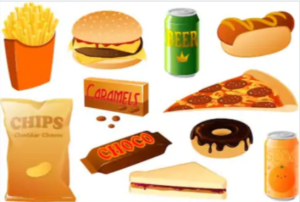Reactive hypoglycemia, or low blood sugar, can indeed be triggered by processed foods.
Reactive hypoglycemia (low blood sugar that can cause deep hunger) and processed foods are tightly linked.
“Much of the ‘food’ that surrounds us in modern society can be classified as processed, at least in some form or fashion,” says Richard Kelley, MD, a practicing physician in Texas for 20+ years, and author of “The Fitness Response,” “The Three-Hour Appetite” and the ebook, “The Fitness Response ‘Diet’ for Women.”
Dr. Kelley continues, “A great percentage of the food we consume in the United States represents concoctions and formulations that most of us could not reproduce, without the assistance of a science and engineering background.”
This shouldn’t be hard to believe. Read any random ingredients list on any frozen dinner product at the local grocer’s.
Then read the ingredients list of any brand of shampoo. You’ll experience some déjà vu.
You’ll also will find ingredients in the food product that don’t fall within the category of the four basic food groups.
What we eat today is not what our great-grandparents ate. Processed foods rely on dirt cheap ingredients, says Dr. Kelley, as the foundation of their products, to minimize investment and maximize profits.
Food is either protein, carbohydrate or fat. Carbs and fat are cheaper than protein as a base ingredient, says Dr. Kelley.
This explains why so many highly processed items are loaded with simple carbohydrates, along with fat, yet low in protein.
To bump up the protein content, many of these products have added soy, in processed form (not good).
How do processed foods cause reactive hypoglycemia?
“The high carbohydrate-low protein ratio of many processed foods can absolutely set the stage for reactive hypoglycemia,” says Dr. Kelley.
“Many processed foods contain high-glycemic carbohydrate, simple sugars or high fructose corn syrup,” the perfect setup for reactive hypoglycemia.
High glycemic items cause a very rapid rise in blood sugar. This prompts the pancreas to go overboard to pump out insulin.
Reactive hypoglycemia can cause intense hunger.
“Insulin drives excess blood glucose into the cells of the body for later use and storage,” continues Dr. Kelley.
“This ‘clearance’ of excess blood glucose from the bloodstream, in response to high-glycemic carbohydrate, typically results in a drop in blood glucose, and in some individuals, a reactive hypoglycemic or state or episode.”
The hunger occurs because the body thinks it’s starved, thanks to the plummeted blood sugar level, even though you just ate a full meal.
Processed foods should not be the foundation of your diet.
 Richard Kelley, MD, is an author, speaker, fitness expert and transformation coach.
Richard Kelley, MD, is an author, speaker, fitness expert and transformation coach.
 Lorra Garrick has been covering medical, fitness and cybersecurity topics for many years, having written thousands of articles for print magazines and websites, including as a ghostwriter. She’s also a former ACE-certified personal trainer.
Lorra Garrick has been covering medical, fitness and cybersecurity topics for many years, having written thousands of articles for print magazines and websites, including as a ghostwriter. She’s also a former ACE-certified personal trainer.
.










































